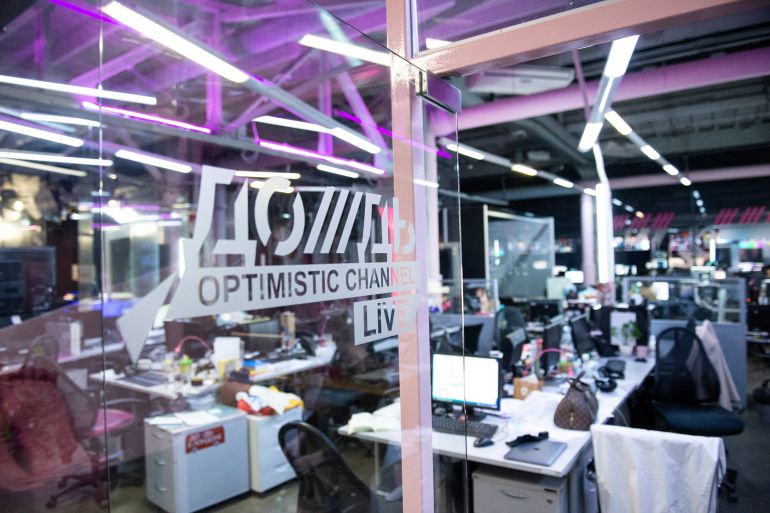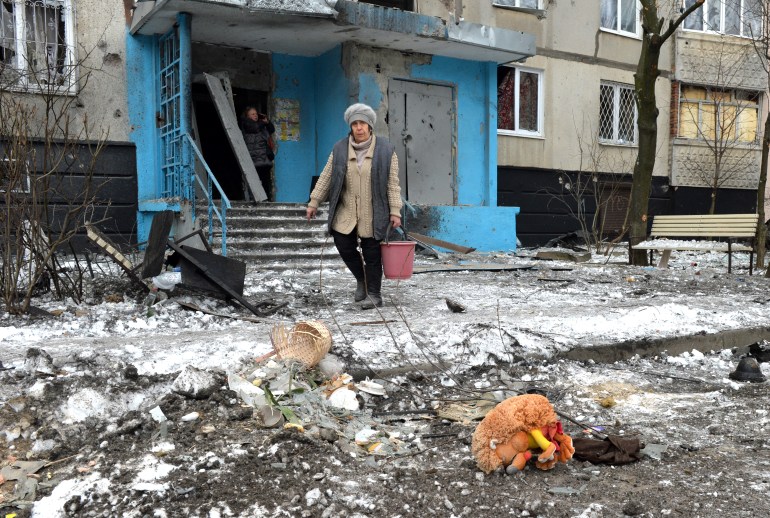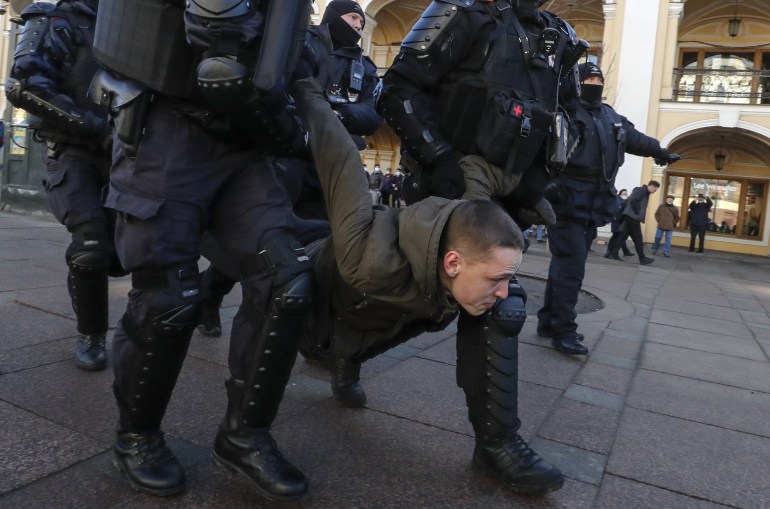Russia tightens grip on media amid Ukraine war
Russians have few options when it comes to the media and now, a pro-war movement using the letter Z as a symbol, is rising.

As Russia’s military campaign into Ukraine continues to fuel Western condemnation, a radically different portrait of the conflict is emerging in Russia.
Last week, the Russian Ministry of Defence acknowledged the loss of 498 soldiers.
Keep reading
list of 4 itemsUkraine’s Roma refugees recount discrimination en route to safety
Photos: Death on Ukraine’s bombarded streets
Xi should pressure Putin to end this war for China’s own sake
While the Ukrainians claim thousands of Russian troops have died, US military analysts believe the true death toll to be somewhere between the Russian and Ukrainian figures.
But it is not just death tolls that appear out of step in Russia.
Russian media are only supposed to report on the war using official, government-approved sources.
In 2014, Alexander Kots, a war correspondent for the popular pro-Kremlin tabloid Komsomolskaya Pravda who had been barred from entering the country by Ukrainian border guards, joked that he could only return to Kyiv in a tank.
Now, he’s doing just that – as he is embedded with the Russian army and pro-Russian rebels.
Government narrative
Kots’s coverage is consistent with the official position on the war – that Moscow is fighting rabid Ukrainian nationalists.
In one recent article, Kots writes that the “Russian military special operation would be better named ‘No to War’,” referring to a slogan chanted by peace protesters because “with this operation, we put an end to the war that is going on in the Donbas, and to the whole civil war that has been declared in Ukraine to everything Russian.”
In another, Kots writes that Ukrainian civilians want to cross the battle lines over to the Russian side but are stopped by Ukrainian forces, who want to use them as human shields.

On Saturday, Kots wrote a glowing obituary of rebel commander Vladimir Zhoga, who died in the battle of Volnovakha, calling him a “Russian hero”.
Separately, Komsomolskaya Pravda has published a list of counterarguments to those who blame Russia for the ongoing conflict.
In that list, the paper highlighted Ukrainian policies that may be considered nationalistic or hostile to Russia – including the Kremlin’s long-held view that “Russian people are not allowed to speak their native language in public life” in Ukraine.
The piece also tackled Russia’s warnings against the word “war”. Media and schools have been banned from referring to the ongoing hostilities as an “invasion”, “attack”, or “declaration of war”.
The Pravda article said that the word “war” itself has been abandoned in describing military campaigns by Western countries, for example, Washington’s “Operation Desert Storm” in Iraq.
But in reality, whatever the official title, journalists continued to describe such events as wars.
Websites blocked
Media is tightly restricted in Russia, and on Friday, lawmakers voted to punish those spreading “fake news” about the conflict with up to 15 years in prison.
Foreign news networks such as Britain’s BBC and Germany’s Deutsche Welle have been blocked, and last week, radio station Echo of Moscow and TV channel Rain – two of the few remaining independent outlets – were taken off the air after being accused of spreading misinformation by the authorities.
On TV Rain’s final broadcast on Thursday, staff walked out of the newsroom. The last words of the presenters were, “no to war,” and, “no to war, indeed.”
After the walkout, the broadcast switched to a recording of the 1991 ballet production of Swan Lake, which was played in a loop during the attempted coup on Soviet leader Mikhail Gorbachev in 1991.
Rain’s last broadcast is the only video left on their YouTube channel.
Just a handful of independent media organisations remain in Russia.
The best-known is the newspaper Novaya Gazeta, whose Nobel Prize-winning editor Dmitry Muratov refuses to trust official sources and relies only on his own correspondents to verify the facts. But even Muratov has had to make compromises.
In a recent dispatch from Odesa featuring interviews with Ukrainian fighters as well as civilians with a wide range of perspectives, any mention of the term “war” itself is replaced with “[special operation]”.
Anti-war, pro-war sentiments simmer
Despite the muzzling of critical voices in the media, anti-war demonstrations show no signs of stopping.
Answering a call from jailed Kremlin opponent Alexey Navalny to protest, 5,000 were detained in 69 cities on Sunday, more than twice the number arrested when the war broke out on February 24.
As the rallies intensify, so does the police response, with reports of batons and stun guns being used on demonstrators.

Officers have also been reportedly stopping people and demanding to check the contents of their phones.
In the meantime, government supporters are using the letter Z as a pro-war symbol to show solidarity with the armed forces.
In one video being shared on social media, former spy Maria Butina, convicted of espionage in the United States, can be seen drawing a Z on her jacket.
Russian gymnast Ivan Kuliak wore the Z symbol on his shirt during an event in Doha, and now faces disciplinary proceedings. In the city of Kazan, a group of terminally ill children in a cancer hospice were lined up to form the letter Z in the snow.
And Russia’s internet censor board, Roskomandzor, changed its Telegram channel handle to emphasise the Latin letter Z.
The Z symbol has been spotted painted on the side of Russian tanks and military vehicles in Ukraine. An Instagram post by the Ministry of Defence suggested the Z symbol stands for “za pobedu”, or “for victory”.